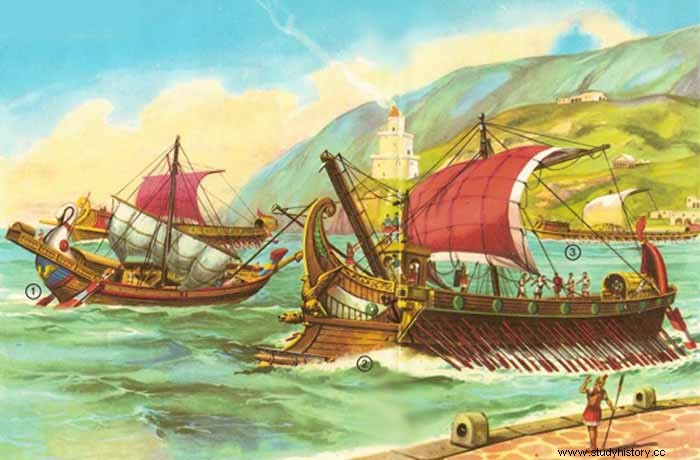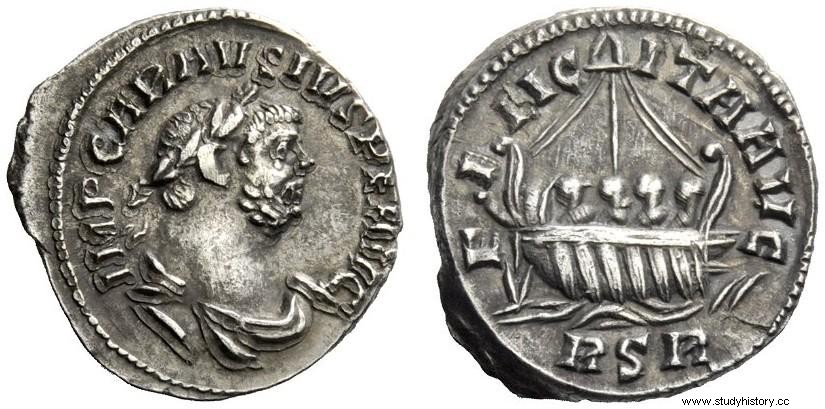In full negotiation for the exit of the United Kingdom from the European Union, commonly known as Brexit (acronym for Britain and Exit , «Great Britain» and «Exit»), and the possible consequences of this new political and, above all, economic panorama, we discover -once again- that nothing new under the sun... in the third century Britannia, the name given by the Romans to the province that occupied the center and south of the current island of Great Britain, already separated / became independent from the Roman Empire (saving the distances, the European Union of the time).

The person responsible for this Roman-style Brexit -to the brave, without a referendum- was Marco Aurelio Carausio , a humble and stocky Meapio (Germanic people who inhabited the territory between the Seine and the Rhine rivers). Despite playing a decisive role in the expansion through the Mediterranean, the Roman fleet never had the prestige of the Roman legions, but it was decisive in this history. Carausius distinguished himself in Emperor Maximian's campaign against the Bagaudae rebels in Gaul in 286. This success, and his former occupation as a sailor, led to his appointment as commander of the Classis Britannica , the Roman fleet of Britannia. The Senate commissioned Carausius to patrol the waters of northern Europe to put an end to pirates attacking coastal towns on both sides of the English Channel. If the success of the mission depended on the number of pirate ships captured, it is clear that Carausio more than complied. But if you look at the methods used… that's another matter. It seems that Carausius on many occasions allowed pirates to plunder towns and then captured their ships (which pleased Rome) and kept the loot (which pleased him personally), and even made deals with the pirates. to share the loot. From Rome, his presence was requested to give explanations of those, more than supposed, rumours. Knowing what awaited him, he took a change of direction and, with the support of the Classis Britannica, the pirates of the area, three legions from Britannia and another from Gaul, declared the independence of Britannia and northern Gaul and proclaimed Emperor of Britain.

Carausius Coin
And because of the fact that the enemy of my enemy is my friend, he won the support of the Picts and other peoples subject to the power of Rome. In 288 Maximian tried to recover the former Roman province, but Carausius and his men managed to defeat him. Carausio, trying to legitimize that unilateral Brexit , he minted his own coinage ( Restitutor Britanniae , Restorer of Britannia) and, believing himself to be on an equal footing from emperor to emperor, tried to establish diplomatic relations with the Empire by recognizing the emperor of Rome. The maritime control and the coasts on both sides of the English Channel, the agreements with the Britons and the racket that was mounting in Rome -4 people at the head of the Empire:two Augustos (Diocletian and Maximian) and two Caesars (Galerius and Constantius)-, allowed Carausius to play emperor for 7 years.
This situation lasted until 293, when Constantius Chlorus, now Caesar of the West, marched on Gaul and defeated the troops of Carausius. Only the island remained, but for this a fleet had to be built that could face that of the Britons. And although the assault on the island would not take place until three years later, Carausio would die that same year, assassinated by one of his own, Alecto . You know, strategies of Rome.
However, a crucial precedent had been established:that Britannia/Great Britain could be an autonomous kingdom subject only to local authority... something that they now want to recover and that Marcus Aurelius Carausius already achieved in the 3rd century.
